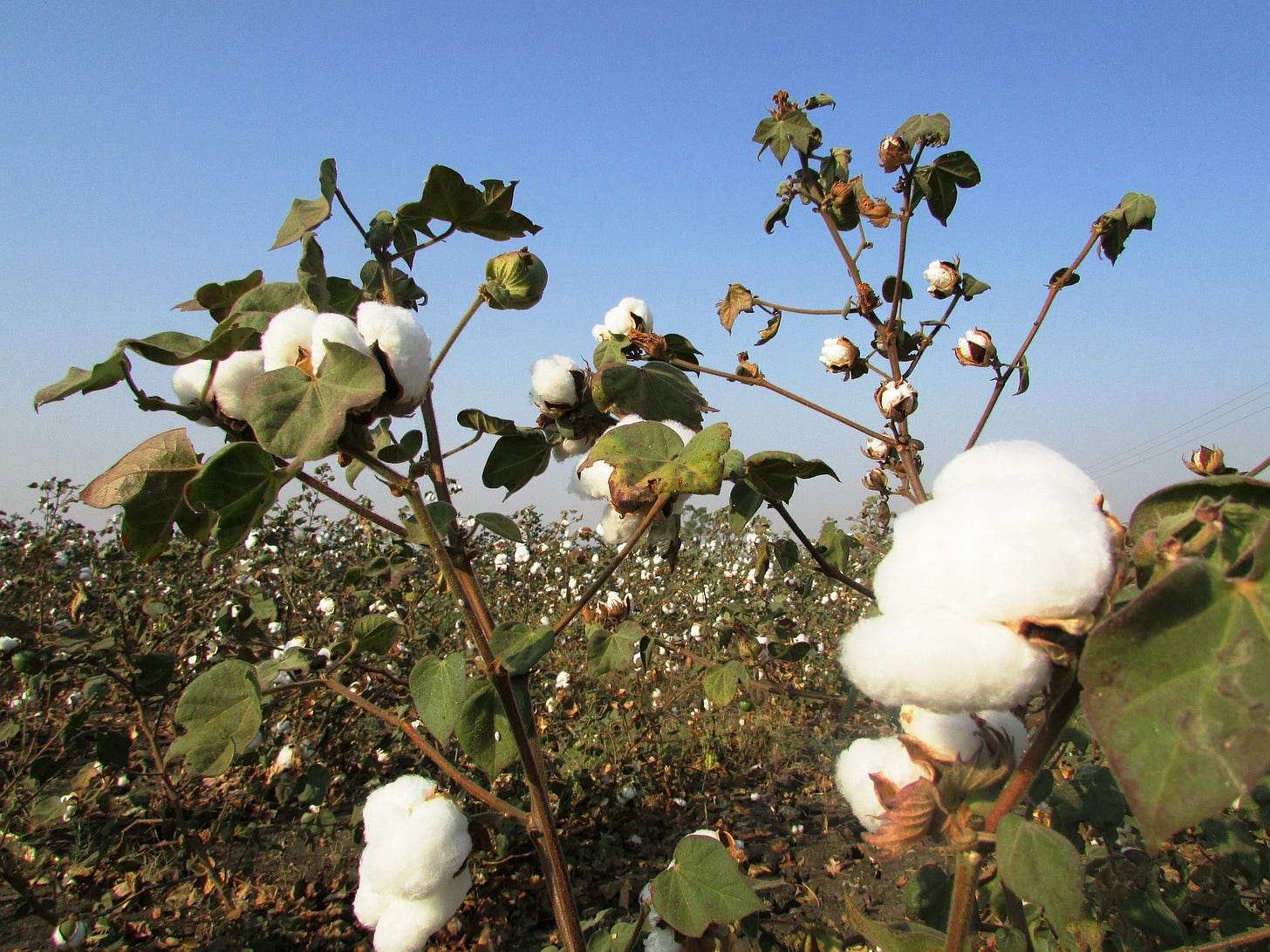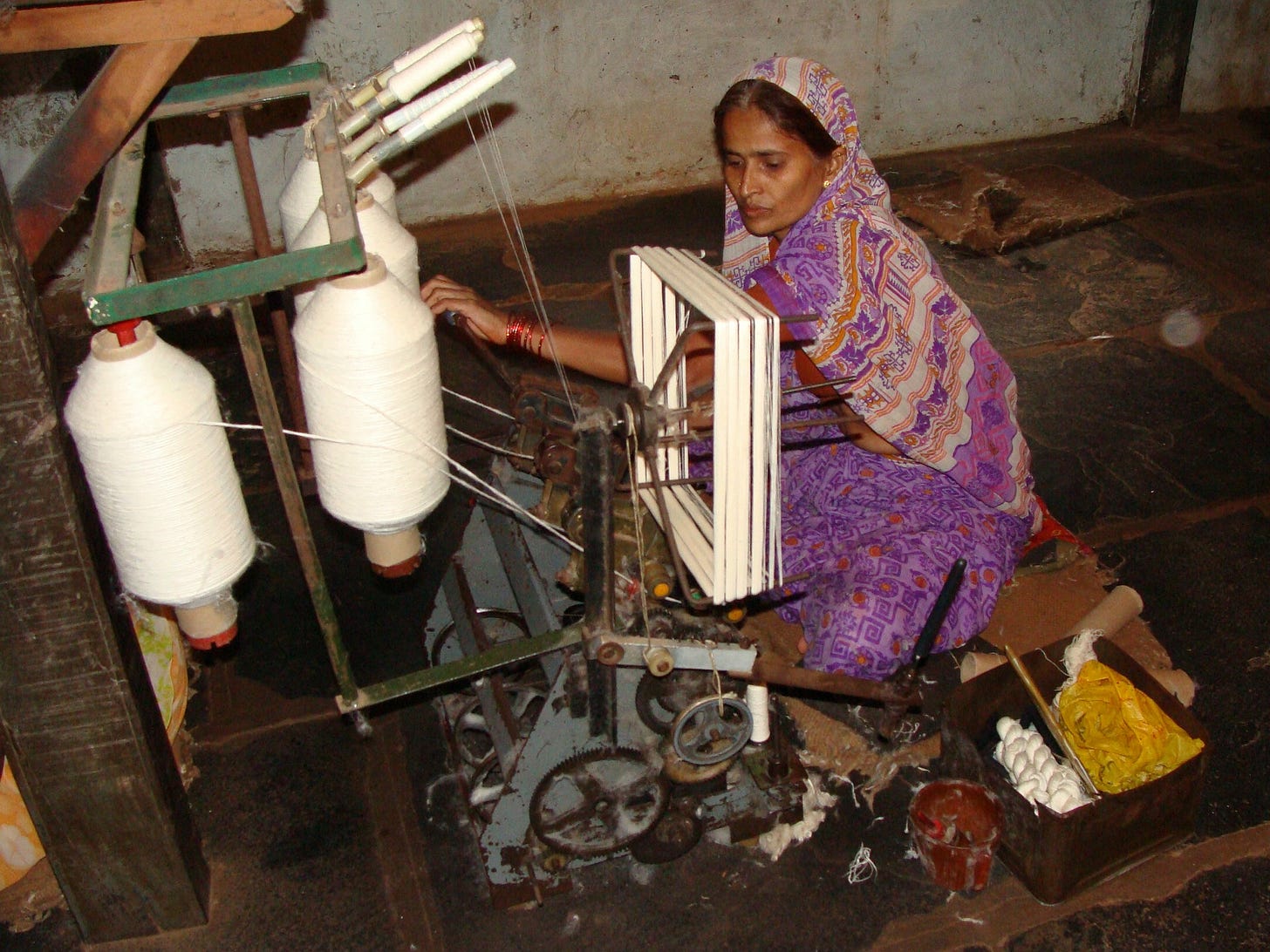Khadi weaving: an anti-colonial symbol turned eco solution
Could this sustainable form of cotton production help spell the end of debt and depression for India’s farmers?
Every day, 28 people working in the farming sector die by suicide in India. Debt, droughts, and exploitation are among the key reasons, but the hard-line BJP government has done little to alleviate the situation. The problem is particularly pronounced in the Western Indian state of Maharashtra, where an estimated 95% of farmers struggle with debt.
A key factor propelling financial instability is the use of BT cotton – a genetically modified variety of cotton, which was first introduced in 2002. The seeds are sold at an exorbitant price of around 2,000 rupees (roughly equivalent to £20) a kilogram.
GMO crops are being grown over large areas of land, and have started to displace several local varieties of seeds, contributing to a loss of biodiversity.

Although yields from BT cotton seeds were initially high, they have now lost their resistance to pests, compelling farmers to add expensive herbicides and pesticides to their produce.
This habitual procedure entangles many farmers in a cycle of debt, and in many unfortunate cases, pushes many to end their lives.
Action towards self-sufficiency
An increasing number of grassroots organisations are helping farmers and economies transition to a more sustainable mode of farming. The hope is that, with the right skills, communities will break away from a reliance on BT cotton.
Ours to Save spoke to Amit Dalvi, an engineer by profession, who moved from the UK to Vidarbha – a region in India – with his wife Swapnaja, and their family. Compelled by the high suicide rates amongst farmers in India, he now works with Gram Seva Mandal (GSM), an 87-year-old organisation with roots in the Indian independence movement.
GSM’s goal is to restore the self-sufficiency of agricultural workers, by harnessing an indigenous and sustainable model of cotton farming. It works with volunteers such as Amit and Swapnaja, training them in the practice of organic farming and high-quality fabric production.
Through bee-keeping and oil-crushing workshops, GSM offers farmers an alternative, sustainable source of revenue. The organisation’s overlying goal is to ‘stimulate and integrate small-village economies’.
Beyond this, Amit and Swapnaja have embraced a long-standing vision to support farmers.
“We would love to revive the long-lost art of khadi weaving.”
Khadi weaving
Khadi, Amit explains, is an indigenous method of hand-spinning fabric such as cotton. It was reclaimed as a symbol of Indian autonomy by figures such as Gandhi.
During British colonial rule in India, Indians were compelled to buy imported British fabrics at an exorbitant price. As an act of defiance, the Swadeshi movement boycotted English products, and embraced khadi as an indigenous symbol of production.
Even today, khadi survives as a tool against the status quo; activist movements such as GSM are attempting to replace the use of BT cotton with the production of indigenous desi cotton in India, in the hope that the practice of khadi can be revived in a sustainable manner.

No electricity or energy is needed, so carbon output is extremely low. A metre of khadi cloth requires around three litres of water, whereas a metre of mill-produced fabric uses 55 litres.
While it can be easy to feel detached from this cause, we as consumers are somewhat complicit in the larger system that is driving Indian farmers to debt. Amit highlights the issue of fast-fashion. The cheap retailing of outfits is chiefly symptomatic of the exploitation of farmers and garment workers in the clothing industry.
Amit explains that a viable way to tackle this would be to “buy fair trade, hand-made clothing”, such as khadi fabrics or organic clothing.
He admits, “the process is slow, but it facilitates so many people’s livelihoods.”
The farming industry in India faces an extremely volatile future, exacerbated in part by the detrimental effects of climate change. Amit, who has been labouring with farmers, notes that “seasonal patterns are shifting, and rainfall is not stable, so farmers cut huge losses.”
“There is no ‘them’. It’s just ‘us’. It’s a collective effort,” Amit emphasises. As grassroots organisations like GSM continue to make clear, sustainable agriculture is a holistic process driven not just by farmers, but equally by consumers.
You can follow Riddhi Kanetkar on Twitter.
Check out Khadi London, a social enterprise that supports women in Indian villages, by providing them with the skills to produce sustainable fabrics. They sell ethically-sourced and environmentally conscious clothing, with an aim of increasing the visibility of women in the workforce in India.



